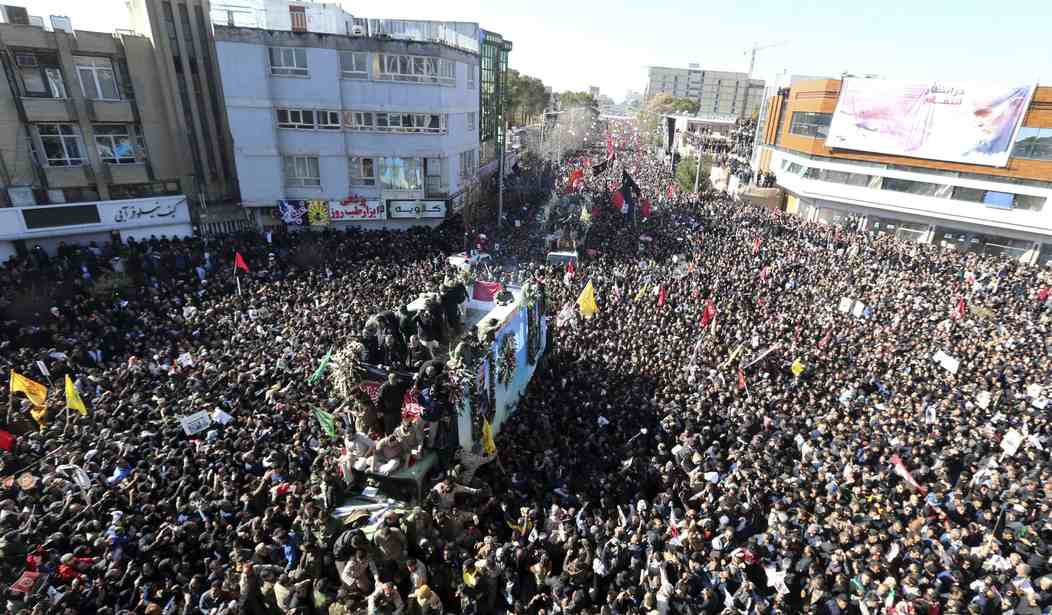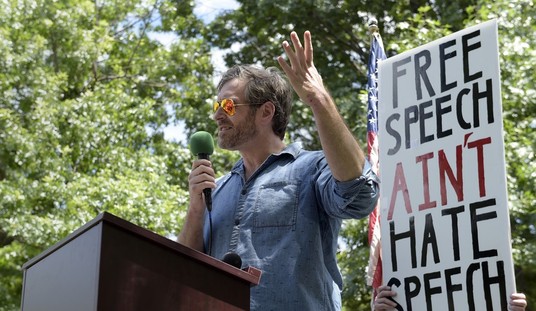Across 2019 Iran ratcheted up the violence against American interests in Iraq, culminating in the rocket attack that killed an American and the militia assault on the U.S. Embassy in Baghdad. An attack on an embassy is an attack on sovereign American soil, an act of war. It was also a test. The Iranian leader responsible for the embassy assault and the deaths of some 600 Americans over the years, Gen. Qasem Soleimani, was traveling around Baghdad with an entourage. His presence there has not gotten nearly enough press attention. Why was he in the capital of Iraq at all? Why did he feel free to take a road trip when he has been on the terrorist watch list for 15 years? Perhaps because he had been in the sights of the last two U.S. presidents, and both elected not to strike.
Whatever drove his decision, it was fatal. President Donald Trump ordered a strike that killed the terrorist mastermind. Iran’s response Tuesday was to launch a dozen or so missiles at a couple of Iraqi bases housing U.S. troops.
But the missiles appear to have caused no casualties and done little damage. Four of the missiles failed.
According to the Washington Post, Iranians have improved their missiles markedly over the past few years.
U.S. and Middle Eastern officials say the upgraded missiles — some with ranges of more than 1,200 miles — are but one of several potential avenues for carrying out Iran’s promise to exact revenge for last week’s killing of Maj. Gen. Qasem Soleimani, Iran’s most powerful military leader. Most experts believe the United States would respond forcefully to any direct military attack on U.S. assets, but Iran would possess the ability to launch a painful counterstrike — such as a truly crippling blow against Persian Gulf oil facilities or an attack on Israel.
It’s difficult to sort out how much of this new information is real and how much is Iranian propaganda. The drone and missile strike on the Saudi oil facility in September was precise and reduced the output of the world’s largest oil refinery by 50% temporarily. But that strike also did far less economic damage than the Iranians probably expected, thanks largely to the American energy revolution unleashed by technology and President Trump. It had no effect on world oil prices. If Iran’s newfound missile capability is real, and four missiles failed and the rest did little damage Tuesday, then it appears Iran launched its trash missiles in response to the Soleimani strike. It has better, more accurate strike capabilities but chose to keep those locked up for now. Tuesday’s missile barrage was evidently both an escalation and de-escalation: Iran directly fired missiles at U.S. personnel from its own soil, but not in a way that was intended to force President Trump to engage clobberin’ time.
Additionally, Iran’s terrorist dogs have yet to bark or even say boo. It is practically routine now for Hizballah to pop off crude missiles into Israel when the Middle Eastern pot is stirring. This has not happened in response to the Soleimani strike. Hizballah does not act without orders from Iran’s Quds Force, of which the late Soleimani was the head.
Hizballah is believed to have spread far beyond its nests in Lebanon, Syria, and the Middle East into the Americas. In our hemisphere, Hizballah is known to be involved in the drug trafficking industry, and is documented to have personnel in Venezuela and the Tri-Border region, and to be operating with the drug cartels in Mexico. The terrorist operation and its banks have been caught and publicly exposed for money laundering several times over the past decade, with the U.S. increasing the pressure across the second half of 2019.
These financial engagements and defeats suggest two things. One, Iran is less able than it wants to fund global terrorist operations directly due to sanctions and the vast increase in American oil production, necessitating Hizballah’s engaging in syndicated crime to fund itself. Two, the scale of the financial defeats may be choking the terrorist army’s ability to travel, recruit, and fund weapons, training, and operations. There are likely other financial squeezes on Hizballah that have not yet made headlines, or are still in progress.
Hizballah may also be learning that working with drug cartels has its limits. It’s useful for infiltration and for generating and moving large amounts of cash, but far less useful for recruiting operatives. Drug cartel operatives are addicted to money and materialism and not, therefore, natural operational allies for terrorists who want what Iran’s mullahs want: jihad, followed by an Islamist police state.
Iran has been at ideological and proxy war with the United States — and civilization at large — since the mullahs took over the country in 1979. It’s a scarce memory now, but prior to that time Iran was a staunch American ally, friendly to Israel, a sparkling cosmopolitan destination, and a source of stability in the region. Iranian women enjoyed Western dress and freedom.
Leadership matters, and when the mullahs took the reins they declared America the “Great Satan,” declared unending hostility toward Israel, and turned the whole country into an apocalyptic jihadist dystopia. They oriented its military toward maintaining large regular forces while also creating one of the world’s most violent jihadist terrorist armies, Hizballah — the “Army of God.” They oppress their own people, and Soleimani is widely known to have been directly involved in killing anti-mullah protesters. The grand throngs who turned out for Suleimani’s funeral had no choice. They live under a Nazi-like regime with extremist Islamist police and informants watching their every move. Older Iranians have living memory of better times. Younger Iranians want to be free. The mullahcracy is oppressive, unelected, self-righteous, and brittle.
Hizballah did not rear its head after the Soleimani strike. That doesn’t mean it won’t at some point. But for now, Iran’s response appears to be one of saving face by offloading some of its older missile inventory, and mixed with panic if they shot down that Ukrainian passenger plane during the fog of war. Did they think the Americans had already sent B-52s in for a strike? If so, the Soleimani strike has delivered its intended message.
It’s a safe bet we won’t see any Iranian generals taking road trips to Baghdad anytime soon.









Join the conversation as a VIP Member